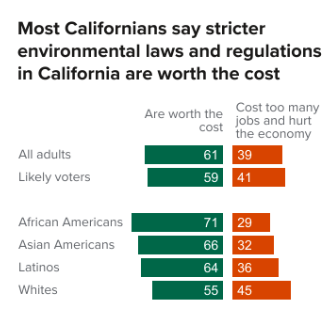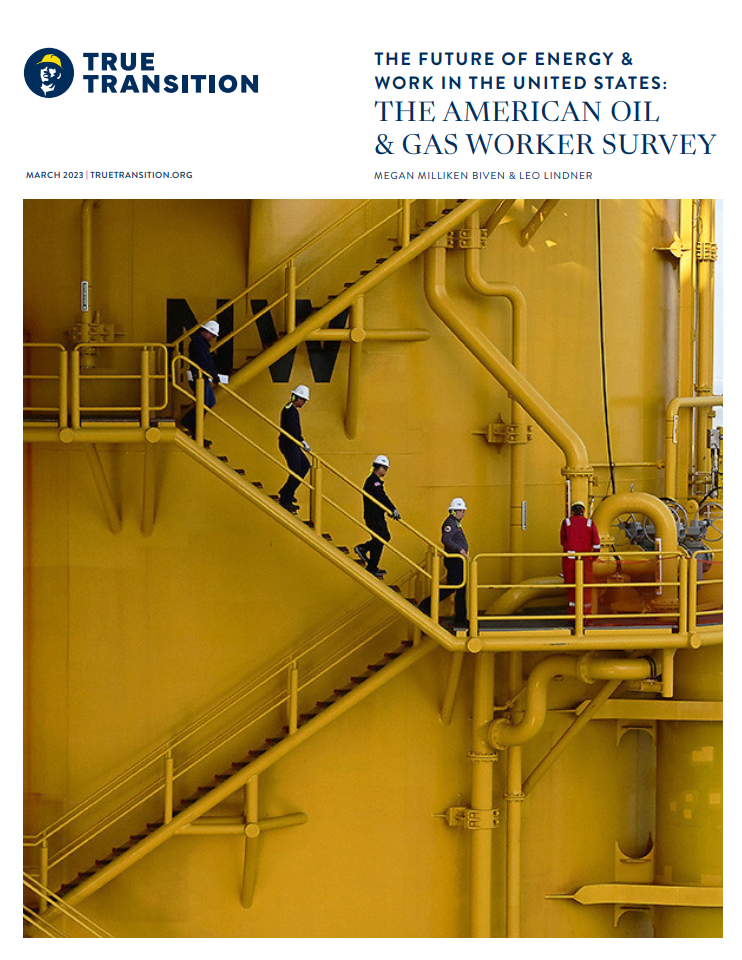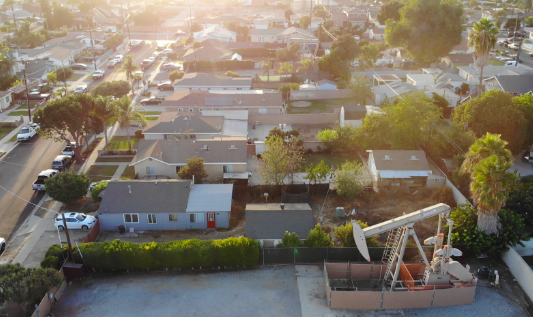Resources
Search below for resources covering the intersection of climate engagement, social science and data analytics.
RESULTS
Funding a Clean and Equitable Energy Transition: Lessons from California
California has been investing in a clean energy transition for decades, and, in recent years, has increasingly targeted funds to under-resourced and marginalized communities. Other states and the federal government have likewise stepped up. There is much to learn from California’s considerable experience. Our report series analyzes California’s decision-making structures — the processes that determine priorities and the mechanisms that turn broad justice principles into action. Our analysis and recommendations are intended to improve California’s programs, help emerging state programs consider the strengths and weaknesses of California’s institutional landscape, and influence emerging federal funding mechanisms.
PPIC Statewide Survey: Californians and the Environment
Californians overwhelmingly support climate action at the state level, and state residents widely back offshore wind and oppose offshore drilling, as they understand that protecting coastal areas is important for the state economy and quality of life. 83% of Californians support allowing wind power and wave energy projects off the California coast. 77% of Californians recognize that climate change has contributed to California’s recent extreme weather events. 73% of Californians support the state law that requires California to reduce its greenhouse gas emissions to 40 percent below 1990 levels by the year 2030. 68% of Californians support the state law that requires 100 percent of the state’s electricity to come from renewable energy sources by the year 2045. 66% of Californians support the state’s cape-and-trade system.
More than two-thirds of California voters expect extreme weather swings to become more common due to climate change, and Californians are deeply concerned about the water situation in the West. 81% of California voters say that it’s important for the state to continue enforcing water conservation policies for residential, commercial, and agricultural water users - including 52% who say it’s “very” important. 69% of California voters expect extreme swings in the state’s weather to become more common because of climate change. 60% of California voters support reducing water deliveries from the Colorado River.
California voters, including those in swing congressional districts (CDs), understand that climate change impacts the weather and the state economy. 61% of California voters say that climate change is either a “crisis” or serious problem, including 53% in swing CDs. 60% of California voters say that climate change plays a major role in extreme weather events, including 53% in swing CDs.
The Future of Energy & Work in the United States: The American Oil & Gas Worker Survey
Cross sectional survey of 1,635 non-management oil and gas workers in the US revealed new insights and key themes relevant to a truly "just transition" from fossil fuels, including:
Environmental Polling Roundup - June 17th, 2022
This post includes climate and environment headlines, data points, and key takeaways from recent public polls - including new polling nationwide on voters’ attitudes toward the two major parties on climate and the environment, new state polling in California underscoring the urgency around climate action in the state, and new state polling in Florida about the state’s transition to clean energy.
Historic Environmental Justice Victory: City of Los Angeles is creating a pathway to phase out existing oil and gas wells
Residents, community organizations, and health care practitioners organized for over a decade to protect the health of residents on the front lines of urban oil extraction in L.A. In January 2022, the Los Angeles City Council voted unanimously to draft an ordinance to prohibit all new oil and gas drilling and to phase out existing drilling operations throughout the City of Los Angeles. This resource is based on an interview with Wendy Miranda (she/they), a community leader with Communities for a Better Environment (CBE) and resident, about the historic victory. The organizing strategy to get this victory involved various lobbying efforts, rallies, press conferences, petition collections, a wide range of community/organization endorsements, phone banking, and social media outreach. Overall, frontline residents providing public comments and sharing their personal experiences were some of the strongest and most powerful tactics. STAND L.A. will continue to be part of the process to help draft an ordinance and direct the City of Los Angeles on how to lead a genuine community participation process. Miranda shares that this victory is proof that frontline communities can lead the change toward a just, equitable transition to a clean energy future.
Most California voters want to see the state address climate change “immediately”, and climate change is by far the top issue for California Democrats. The poll found that an outright majority (55%) believe that California should take action on climate change “immediately,” while just one-fifth (20%) believe that the state can wait instead of acting immediately and just one-quarter (25%) oppose climate action over the next few years. The poll also found that climate is a uniquely important issue for Democratic voters in particular: 57% of Democratic voters in California say that climate and the environment are among their top three issue priorities, “twice as high as any other issue.” Additionally, even in the midst of high inflation and economic unease, the poll shows that California voters prefer a candidate who is focused on climate change and the environmental issues facing the state over a fossil fuel-backed candidate who sets these issues aside in order to focus on the economy.
Environmental Polling Roundup - May 27th, 2022
This post includes climate and environment headlines, data points, and key takeaways from recent public polls - including new polling on voters’ relative trust in the two parties to handle climate change, energy, and the environment; a new poll showing widespread pessimism about the country’s handling of climate change and the environment; and new polls about nuclear power nationwide and in California.
Poll: Strong local and statewide support for Diablo Canyon Nuclear Power Plant
California voters lean toward keeping nuclear energy in the state’s power mix, while their support for natural gas has declined. The poll encouragingly finds that voters overwhelmingly approve of solar (91% approve, including 73% who say they “definitely” approve of it) and wind (81% approve, including 67% who “definitely” approve of it) being used as electricity sources for the state. A clear majority also approve of natural gas as an electricity source (71% approve), though with considerably less enthusiasm (40% “definitely” approve) than they feel about solar and wind. Californians are relatively more split in their feelings about nuclear power, but over half approve of it being included in the state’s energy mix (54% approve / 36% disapprove). The poll release also includes time-series trend data from 2013 for comparison. This trend data shows that, over the past nine years, Californians’ approval of nuclear (51% to 54%, +3) and solar (94% to 91%, -3) has barely budged, while there’s been a dip in approval of wind power (92% to 84%, -8) and a more sizable drop in approval of natural gas (89% to 71%, -18).
Pagination
- Page 1
- Next page







